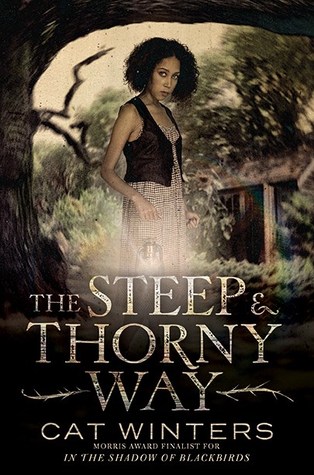I really liked Cat Winters' The Cure For Dreaming, so when I saw that The Steep and Thorny Way was a re-telling of Hamlet, done by an author I liked, well, I just HAD to read it.
My thoughts: meh.
It's very, very loosely tied to Hamlet. Very loosely. Like, we get the dead father's ghost coming back and a few characters who have resemblances to Shakespeare's characters only in the most lax sense. (Rosenkrantz and Guildenstern -- aka Robbie and Gil-- are treacherous, Laertes -- Laurie -- is hot-tempered, Ophelia -- Fleur -- grows flowers to remind us of the insanity scene and gets picked on by her brother. But Greta -- Gertrude -- and Clyde -- Claudius -- don't follow the original much except that they marry, and the Horatio character -- Joe -- is so far removed from Shakespeare that his only resemblance to Horatio is that he is a confidant for Hannalee, who is Hamlet, of course.) And no one dies except Hannalee's dad Hank.
The story itself works except that Winters made it so didactic that its MESSAGE is shoved right into the reader's face over and over and over.
Look, I agree that racism and homophobia are bad things, and I fight against them daily as a school teacher (along with sexism, which completes the Unholy Trinity of current political conservatism). But this story reads like a white woman's penance for her racist ancestors. There is no subtlety about the MESSAGE, no chance for the reader to discover lessons from history, no enlightenment. It reads like a Sunday School story (except that Sunday School stories, at least Mormon ones, do not show homophobia and racism as evils).
The MESSAGE is good, but the book is so very much MESSAGE that it ceases to be a story. Perhaps if the story had had some subplots so that there was more to the book than just the MESSAGE, I would have liked it better.
UPDATE:
In response to a negative comment about this review on Amazon, I added the following response:
Yes, I prefer good writing as a method for making one's point.
May I suggest to you works that allow the reader to discover the point instead of preaching it to them in an off-putting way? For works that show in a masterful way the ugliness of racism, try Twain's Adventures of Huckleberry Finn, Scott's Ivanhoe, and Shakespeare's Othello and The Merchant of Venice. Oh, and if you want YA that shows ugly, hateful racism and its consequences, try the Harry Potter series. Other works which allow the reader to discover very powerful messages include Poe's "Ligea," "The Cask of Amontillado," and "The Tell-Tale Heart" (showing that psychotic murderers aren't always obvious to other people), Hawthorne's "The Birth Mark" (showing that domestic abuse is horrifying and deadly) and "Young Goodman Brown" (showing how life-ruining hypocritical religiosity can be), and O. Henry's "A Retrieved Reformation" (showing that sometimes rules need to be bent a little).
Winters did much better at subtlety in The Cure For Dreaming. I expected the same of her in this book, but I was disappointed. Had she taken the time to write Thorny more skillfully, it might have been a powerfully moving book for teen readers. As it is, it's preachy. Teens are turned off when someone preaches to them.

No comments:
Post a Comment